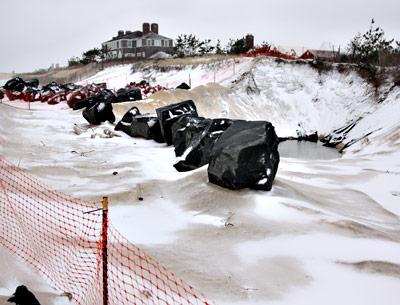Revetment Still on Hold

Almost two months after it was issued, the temporary restraining order halting construction of a rock revetment on the beach in front of 11 West End Road in East Hampton remains in place.
Pending a determination in thµe lawsuit filed by the East Hampton Town Trustees to halt the project, David Eagan, an attorney representing the trustees, is now seeking to reduce the $1 million bond that Justice Hector LaSalle instructed them to post with the county treasurer’s office. The bond, which Mr. Eagan called excessive, would be used to reimburse Mollie Zweig, who owns the property, for any damages incurred as a consequence of the temporary restraining order.
The trustees have retained Stephen Leatherman, director of the Laboratory for Coastal Research at Florida International University, to provide expert testimony. To date, Ms. Zweig has relied on the testimony of Aram Terchunian of First Coastal, the contractor that is to perform the work, Mr. Eagan said. Stephen Angel, an attorney representing Ms. Zweig, did not return a call seeking comment.
“A lot of what they’re arguing is that the whole property could potentially be flooded,” Mr. Eagan said, referring to Ms. Zweig’s legal representation. Dr. Leatherman, who is also known as Dr. Beach, will testify that any flooding on Ms. Zweig’s property would happen regardless of the existence of a revetment and should not be taken into consideration, Mr. Eagan said. “The only damage she could incur is further erosion,” he said. “We’re trying to get that [bond] reduced to something more reasonable, and we have expert testimony to that effect.”
Additionally, Mr. Eagan said, “we’re going to re-argue the fact that a bond is not required as a matter of law on the grounds that municipal corporations are exempt under state law from giving bond, and [that] a recent amendment to the general municipal law, which gave the trustees municipal corporation status for the purpose of receiving ownership of public lands, was enough to put them in that category for this purpose. We think it’s a bad precedent to have a government agency have to put up a bond.” Furthermore, he said, “the law says the amount can’t be excessive and can’t be related to speculative damages.”
The East Hampton Village Zoning Board of Appeals approved Ms. Zweig’s application, which also included removal of a rock groin, restoration of an eroded dune, planting of beach grass, and installation of sand fencing, on Oct. 11. The trustees, who oversee the town’s beaches, waterways, and bottomlands on behalf of the public, strenuously objected to the project, contending that most, if not all, of the property on which it would take place is within their jurisdiction. Prior to the zoning board’s determination, Diane McNally, the trustees’ clerk, appeared before the board to argue against the project.
On Nov. 7, Mr. Eagan filed a request for judicial intervention on behalf of the trustees against Ms. Zweig, East Hampton Village, the village Z.B.A., and the Village Department of Code Enforcement, as well as the Town of East Hampton and the town Z.B.A. The petition sought to nullify the village Z.B.A.’s Oct. 11 decision.
First Coastal of Westhampton Beach commenced the project on Nov. 11, Veterans Day, when the courts were closed. Late on Nov. 13, following five hours of arguments over two days, Justice Paul L. Baisley Jr. issued a temporary restraining order. The case, Mr. Eagan said, was then assigned to Justice LaSalle, who, after a brief hearing in November, determined to continue the temporary restraining order.
Testimony to resolve the bond dispute is due to Justice LaSalle by Friday, Jan. 17, Mr. Eagan said.
